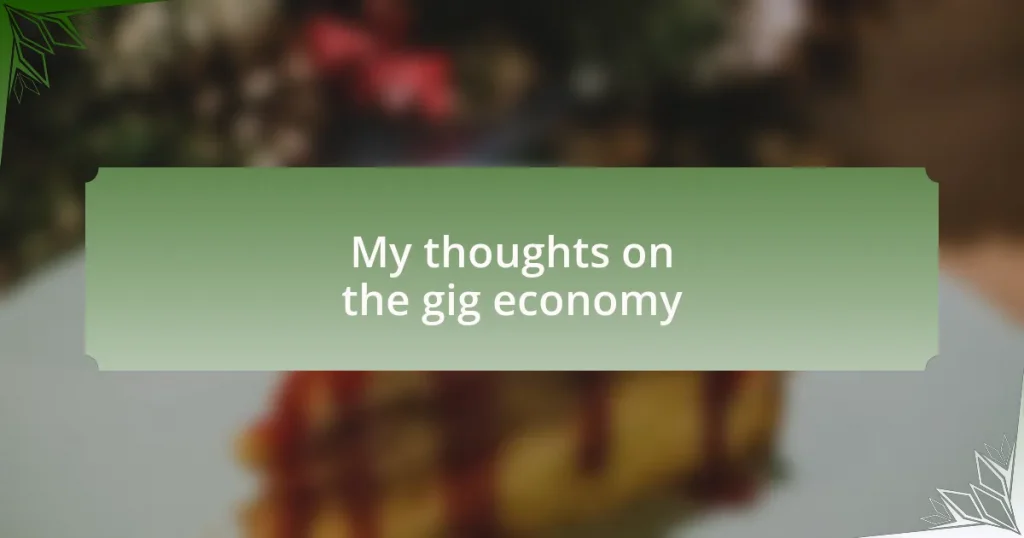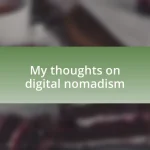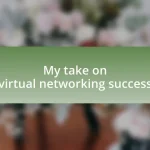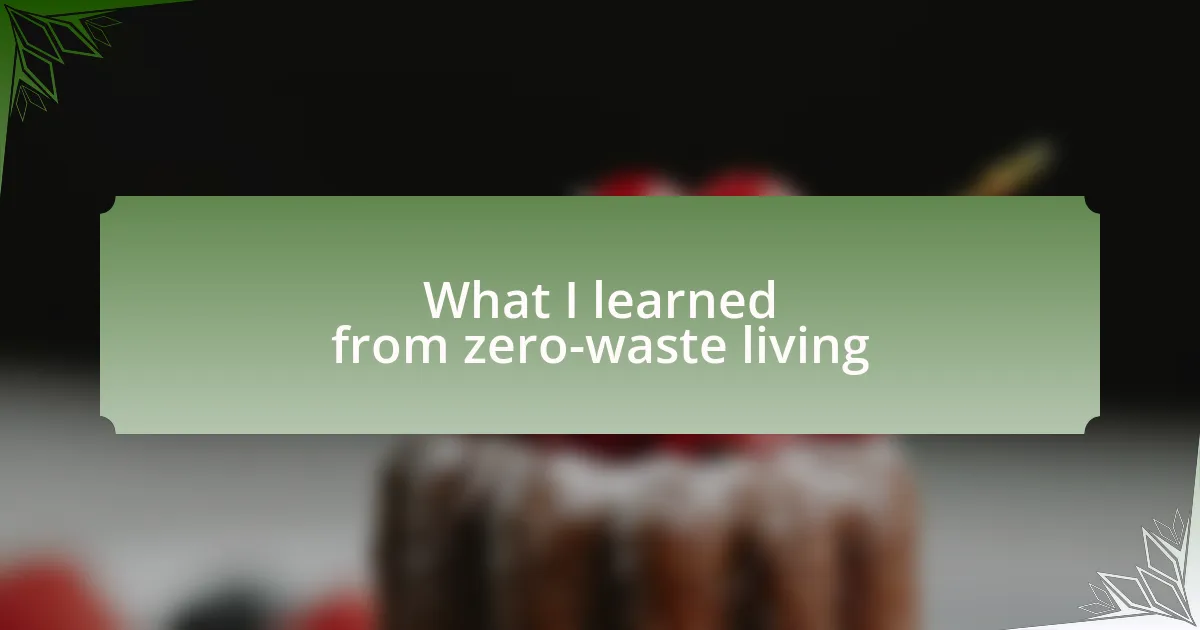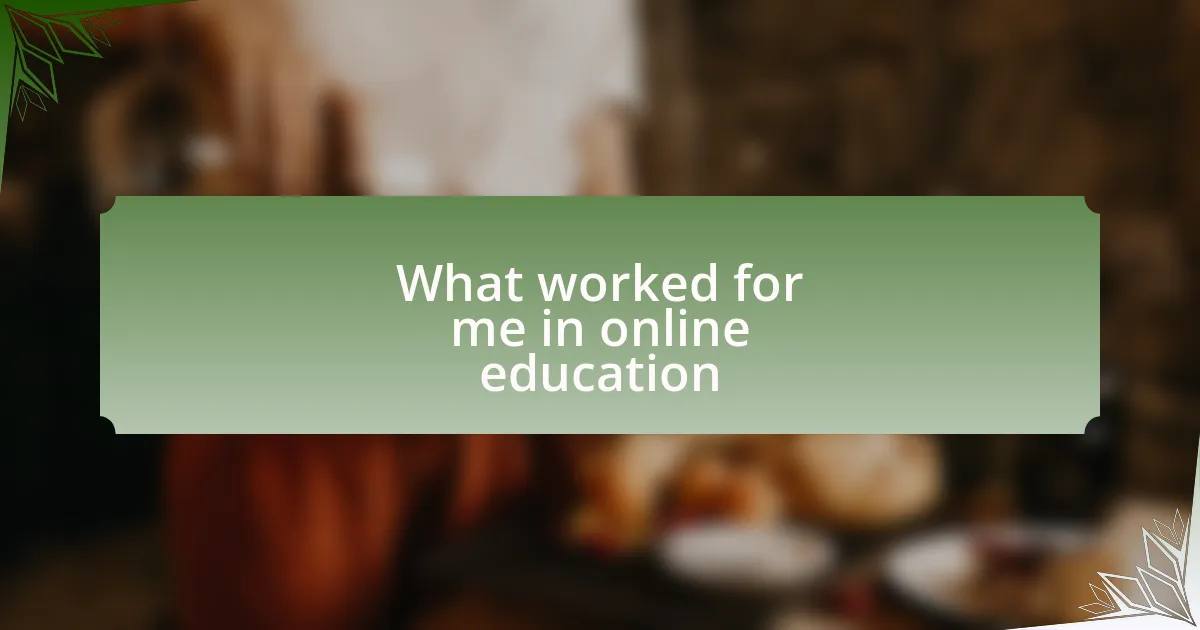Key takeaways:
- The gig economy offers flexibility and higher earnings potential but presents challenges like income instability and lack of benefits.
- Creativity thrives in the gig economy, particularly in fields like wedding cake design, but competition and marketing are significant hurdles.
- Networking is essential for success in a crowded market, with personal connections often determining opportunities for freelancers.
Author: Evelyn Carter
Bio: Evelyn Carter is an award-winning author known for her gripping psychological thrillers and captivating contemporary fiction. With a background in psychology, she skillfully weaves intricate character studies and suspenseful plots, engaging readers from the first page to the last. Her debut novel, “Shadows of the Mind,” was praised for its sharp insights and unexpected twists, earning her a place among the best new voices in literature. When she’s not writing, Evelyn enjoys exploring the great outdoors and volunteering at her local animal shelter. She lives in Portland, Oregon, with her two spirited rescue dogs.
Understanding the gig economy
The gig economy is a labor market characterized by short-term contracts and freelance work rather than permanent jobs. I remember the first time I dabbled in freelance work; it felt liberating but also nerve-wracking. You might wonder, how does this affect job security? Well, while it offers flexibility, it also brings uncertainty, which can be a double-edged sword.
At its core, the gig economy thrives on digital platforms that connect workers with clients. I recently tried using an app to find some side gigs, and it was fascinating to see how quickly I could connect with people needing my skills. Have you ever thought about how technology has reshaped our work lives? It can feel like an exciting frontier, but it also requires us to adapt quickly to changing demands and expectations.
Many people are drawn to the gig economy for the promise of independence and often, the potential for higher earnings. I’ve talked to fellow freelancers who celebrate their choice to work on their terms, but they also voice concerns about inconsistent income. Isn’t it intriguing how this newfound freedom can come with its own set of anxieties?
Impact of the gig economy
The gig economy significantly impacts traditional work structures, creating a shift in how we view employment. I recall a time when a friend of mine transitioned from a stable job to becoming a full-time freelancer. While she gained flexibility, the stress of unpredictable income was always looming—can you imagine living paycheck to paycheck amidst a sea of opportunities that may or may not materialize?
In the wedding cake business, for instance, I’ve seen how the gig economy attracts talented bakers who prefer crafting unique designs over following set menus in conventional bakeries. They thrive on platforms that allow them to showcase their creativity and reach a wider audience. But isn’t it bittersweet? These bakers enjoy the thrill of entrepreneurship, yet they also face challenges like marketing their brand and managing client expectations with little support.
Moreover, the rise of the gig economy has led to increasing competition. As I connect with cake decorators and vendors, I’ve noticed many struggle to stand out in this crowded market. It prompts the question: How do we differentiate ourselves when so many options are available? It’s a learning curve that requires resilience and innovation. From my experience, embracing this change can lead to growth, but it often demands a willingness to adapt continually.
Benefits of the gig economy
The gig economy offers a remarkable level of flexibility that many people cherish. I once attended a wedding where the baker was able to create a stunning cake design tailored to the couple’s theme, all because she could choose projects that inspired her. This kind of creative freedom often leads to better work-life balance, allowing artists in the wedding industry to prioritize both their craft and personal lives. Doesn’t that sound appealing?
Another significant benefit is the opportunity for diverse income streams. I’ve spoken with a freelance cake designer who juggles multiple clients and events, providing her with a financial cushion that a single job might not offer. It’s fascinating how this model enables individuals to tap into different niches—some create cakes for weddings, others for corporate events, and even themed parties. This variety not only keeps the work exciting but also cushions against economic downturns. How many conventional jobs can boast that kind of security?
Moreover, the gig economy empowers bakers to build their brands online. I remember chatting with a friend who started her cake business on social media. She leveraged platforms to showcase her delectable creations, connecting with customers worldwide. This digital presence can lead to significant exposure that traditional bakery models might struggle to achieve. Isn’t it inspiring how a simple Instagram post can turn into an order for a wedding cake thousands of miles away?
Challenges in the gig economy
The gig economy, while brimming with opportunities, also presents unique challenges that can be quite daunting. I recall discussing these hurdles with a friend who does freelance event planning. She often struggles with fluctuating income; one month she might be overwhelmed with bookings, while the next could lead to a dry spell. Doesn’t it make you wonder how that rollercoaster ride of finances affects one’s planning for future ventures?
Another challenge is the lack of benefits that traditional employees enjoy. I once had a conversation with a talented cake decorator who had to forgo health insurance simply because she worked gig-to-gig. It’s a sobering reality and makes me think about how the absence of a safety net can lead to stress and anxiety, affecting not just work performance but personal life as well.
Additionally, building a reliable client base can feel like an uphill battle in a crowded market. I remember a time when a neighbor tried to break into the wedding cake scene, only to find that competition was fierce and online visibility crucial. It forced her to invest time not just in baking but in marketing and networking—requirement skills that many creatives might not initially possess. Doesn’t it make you reflect on how seamless a conventional job could sometimes seem in comparison?
Gig economy and wedding cakes
While the gig economy offers flexibility for bakers and decorators in the wedding cake sector, it can also lead to unpredictable workflows. I remember a time when a friend who freelanced as a cake designer juggled multiple orders for a weekend wedding rush only to be faced with a sudden cancellation. This kind of volatility can not only disrupt financial stability but also impact the emotional investment in one’s craft.
Moreover, the pressure to stand out in a saturated market can transform creativity into a high-stakes game. I’ve seen new bakers pour their hearts into elaborate designs, only to feel disheartened when their cakes don’t gain the recognition they deserve. It makes me ponder how disappointing it must be to invest so much effort, only to be overshadowed by more established names or those with better marketing tactics.
Networking plays a crucial role, yet I know firsthand that forming those connections is often easier said than done. I once attended a local wedding expo that promised many opportunities, but instead, I found myself amidst a sea of similar vendors, each vying for attention. This experience taught me that in the gig economy, success often hinges on not just talent but the ability to navigate social landscapes to create lasting partnerships. How do you think we can amplify our voices in such a crowded marketplace?
